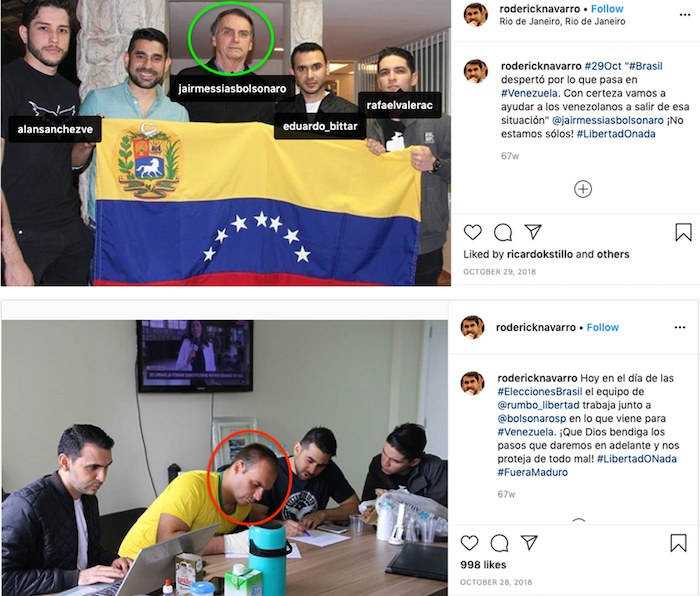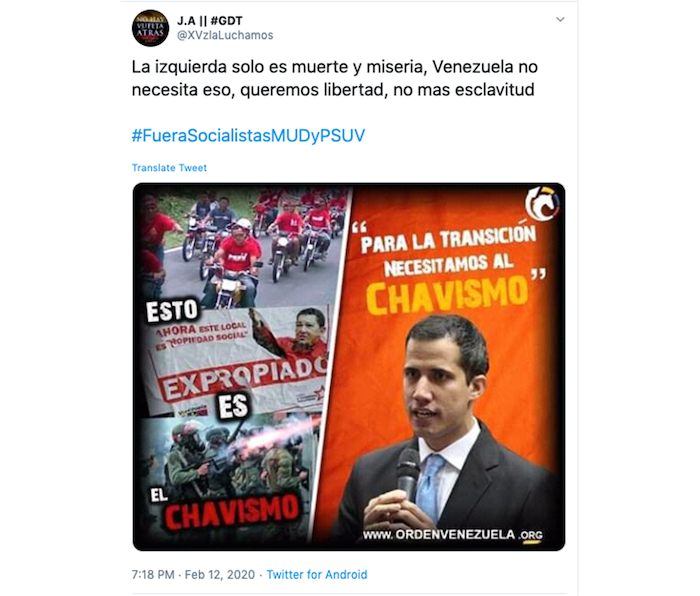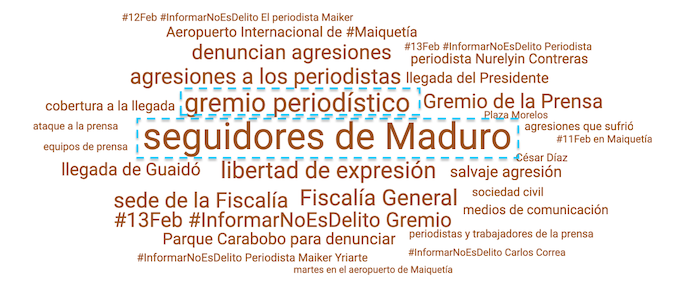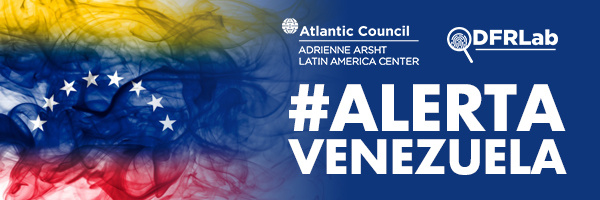#AlertaVenezuela is leading the way in identifying, exposing, and explaining disinformation within the context of one of the Western Hemisphere’s largest crises in recent history, where the fight for control of the information space will continue to pose a challenge for the region.
Top Story
Venezuelan right-wing movements link Guaidó to Maduro
A group of Twitter accounts linked to Venezuelan right-wing movements, such as Rumbo Libertad and Derecha Ciudadana, pushed hashtags not only against Nicolás Maduro but also against Juan Guaidó on Twitter. In some tweets, the group asked for military intervention and misleadingly claimed that Guaidó supported the Maduro regime.
The accounts promoted nine hashtags between January and February 2020 as a means of portraying themselves as the opposition that can put an end to the Maduro regime with foreign military assistance, thereby implying that Guaidó is incapable of successfully challenging Maduro. The accounts used different events to push the hashtags, including the Third Western Hemisphere Counterterrorism Ministerial in Colombia on January 20 and Guaidó’s international tour to Europe and the Western Hemisphere, which finished on February 11.
The first hashtag, #ChavismoEsTerrorismo (“ChavismIsTerrorism”), was promoted by the right-wing accounts between January 9 and January 11. The accounts claimed there was a connection between the Maduro regime, Hezbollah’s terrorist faction, the Iranian regime, and armed groups in Colombia such as the FARC (Fuerzas Armadas Revolucionarias de Colombia [Colombian Revolutionary Armed Forces]) dissidents and the ELN (Ejército de Liberación Nacional [National Liberation Army]).
@RoderickNavarro, coordinator of the Venezuelan movement Rumbo Libertad, used the hashtag #ChavismoEsTerrorismo on January 10, when he uploaded a video of himself to Twitter reading a document to Brazilian representatives. On his Instagram account, Navarro has pictures with right-wing Brazilian president Jair Bolsonaro and his son Eduardo Bolsonaro.

Some of the accounts promoting the hashtags attacked Guaidó after he visited the United States in February, arguing that Guaidó was supporting Maduro with a “false opposition.”
The account @XVzlaLuchamos tweeted a meme using an incomplete excerpt of a statement by Guaidó out of context: “For the transition, we need Chavismo,” to imply Guaidó was supporting Chavismo. The original, complete phrase appeared on January 10, 2019, in an interview that Guaidó gave to the Spanish outlet La Razón: “We live in a dictatorship, and for the transition, we need to be inclusive of Chavismo, of those that have disassociated themselves [from Maduro], of those still afraid to express themselves because they do not have a place to land.”

Talk of the Country
In the media
On January 14, 2020, Brazilian media outlet G1 published “Bolsonaro ‘está arrastando as forças militares do Brasil a conflito armado’ com a Venezuela, diz Maduro” (“Bolsonaro ‘is drawing Brazil’s military forces into an armed conflict’ with Venezuela, says Maduro”). The article garnered 49,600 interactions on Facebook and Twitter combined. The information in the G1 article had originally been published by Agence France-Presse, which covered a Maduro press conference in Caracas on January 14. According to G1, Maduro said Bolsonaro supported “the assault of military deserters against the Venezuelan Armed Forces detachment in the state of Bolívar on December 22 [2019].” Bolívar is on Venezuela’s southern border with Brazil. The Brazilian media outlet also quoted Maduro as saying “there are terrorists in Brazilian territory preparing attacks and also military incursions against Venezuela.” In the press conference, Maduro requested that U.S. President Donald Trump “not be ‘fooled’ by ‘hawks’ and the Venezuelan opposition.”
On January 13, 2020, BBC News correspondent in Venezuela, Guillermo D. Olmo, published “Venezuela: de qué tipo son y por qué estaban allí los misiles desplegados por el ejército cuando Juan Guaidó regresó al país” (“Venezuela: why were missiles deployed by the military when Juan Guaidó returned to the country, and what kind were they”). The publication explained, alongside experts’ analyses, why the Maduro regime deployed Russian air defense systems and other heavy equipment close to the Maiquetía airport the day Guaidó returned to Venezuela and at the La Carlota airbase in Caracas the following day. The article explained the deployment of the equipment could have been tied to preparations for the “Bolivarian Shield 2020” – military exercises conducted by the army and Bolivarian militias on February 15 and February 17 – or to “send a message to the people” after Guaidó obtained international support while on his tour.
What’s Trending
On Social Media

The hashtag #InformarNoEsDelito (“To inform is not a crime”) trended on Twitter between January 11 and January 13, 2020, according to Trendinalia. The hashtag was first deployed in defense of journalists and media staff after they were physically attacked by Maduro regime supporters (e.g., “colectivos” and public workers) while covering Guaidó’s arrival at Maiquetía airport.
At least 12 journalists and media staff were attacked on February 11, according to Espacio Público, a Venezuelan civil organization that promotes and defends freedom of speech. Espacio Público said that in addition to the violent attacks, “the Bolivarian National Guard (GNB) tried to disperse the media” that were at the airport. The organization also denounced a statement by Diosdado Cabello, president of the Constituent National Assembly and Maduro’s second-in-command, which “congratulated the aggressors, pointing them out as ‘patriotic people’ and insisted that they would defend the revolution ‘at any time and in any place.’” In January, 110 violations against the right to freedom of speech occurred in Venezuela, according to Espacio Público.
Journalists criticized the Maduro forces, including the Bolivarian National Police (PNB) and the GNB for standing by and doing nothing. The journalists used #InformarNoEsDelito to broadcast information about the violence against them and to promote demonstrations denouncing the Maduro regime. Nurelyin Contreras, a journalist from the Venezuelan media outlet Punto de Corte, tweeted on February 13: “a man hits me on the cheek, and all I see is a policeman sitting in a chair.” Contreras also denounced Cabello, who mocked her by saying that “the hair that was taken from Contreras was a ‘toupee.’”
The most tweeted phrase alongside the hashtag was “seguidores de Maduro” (“Maduro supporters”) with 405 mentions. Other phrases were “gremio periodístico” (“journalistic trade”) and “libertad de expresión” (“Freedom of speech”).

Official Statements
“Venezolanos, tenemos la estrategia, el compromiso del mundo y las herramientas para salir adelante. Escalaremos la presión hasta donde sea necesario. Debemos actuar en conjunto. Les pido confianza, asumamos nuestro rol de movilización. Atentos a la agenda de los próximos días.”
“Venezuelans, we have the strategy, the world’s commitment and the tools to get ahead. We will scale up pressure to the extent necessary. We must act in unity. I ask for your trust, let’s take on our mobilization role. Keep an eye on the agenda for the coming days.” – Juan Guaidó on Twitter on February 15. Guaidó published statements in a thread about his tour, saying he had sufficient support to hold “presidential and parliamentary free elections. Nobody will be party to a farce, nor to sham elections.”
“Estamos dando un claro mensaje al mundo de dignidad y coraje, frente al abuso obsesivo y criminal del gobierno de los EE.UU. contra el pueblo venezolano. ¡No han podido ni podrán derrotar jamás a Venezuela!”
“We are sending a clear message of dignity and courage to the world, in the face of the obsessive and criminal abuse of the U.S. government against the Venezuelan people. They have not been able, and they will not be able, to defeat Venezuela!” – Nicolás Maduro on Twitter on February 15. In the same tweet, Maduro published a video in which the regime is demanding justice to the International Criminal Court about an “economic and humanitarian war” against Venezuela.
Our Team in the News
The Adrienne Arsht Latin America Center’s December 2019 event on Maduro’s gold mining operations reentered the news on February 13 when new revelations arose regarding the regime laundering money through Swiss banks. Lisseth Boon, an investigative journalist who spoke at the event, was quoted in an Infobae article in Argentina. The article was republished in Venezuela Unida and La Patilla in Venezuela.
Recent Analyses
From the Adrienne Arsht Latin America Center: In late January, the Spanish government broke diplomatic protocol with many of its European partners and its own historical precedent by announcing Prime Minister Pedro Sánchez would not meet with Guaidó, whom those partners all recognize as interim president of Venezuela. Cristina Guevara, project assistant at the Adrienne Arsht Latin America Center, analyzed how the decision was seen as indicative of the influence of far-left actors in Spain’s coalition government consisting of the Socialist Party of Spain (PSOE) and left-wing party Podemos in a New Atlanticist blog post published on February 18, 2020.
Subscribe to the #AlertaVenezuela newsletter
To receive future editions of the #AlertaVenezuela newsletter each week, sign up below!
